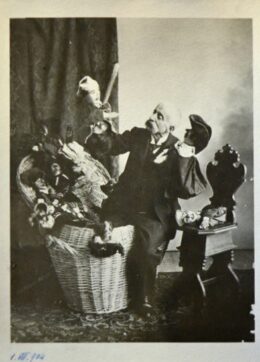Handwritten summary
16 pages
Author(s)
Guerrino Meschino
Guerrino detto il Meschino Agl'alberi del Sole Alla grotta della Fata Alcina Con Faggiolino suo scudiero
The manuscript of Guerrino detto il Meschino agl’aberi del sole alla grotta della fata Alcina con Faggiolino suo scudiero (Poor Guerrin at the trees of the sun in the cave of the fairy Alcina with his squire Faggiolino) summarises the play in details and presents a first version in six parts and a shorter version (in four parts) of the same story. The most complete version is described here.
The play takes up the long plot of the novel Il Guerrin Meschino by Andrea de Barberino (1410), a work adapted many times by the Italian puppeteers of the 19th century. Though the order of the events is not always respected, the main story, the relationships between the various characters and their names remain unchanged. The manuscript is almost entirely written in Italian, but it contains a few short parts written in the Emilian dialect, intended for the character Faggiolino. Sometimes, the mention “lots of nonsense on the part of the servants” appears, suggesting moments when the flow of the story was interrupted by the taunts of the characters, which were typical of Emilan glove-puppet theatre.
The play was first performed in 1869, and taken up again in 1872.
An orphan finds his parents
The Emperor is moved by the sadness of Guerrino il Meschino, who learnt about his origins through the perfidious Brunoro: when he was an infant, some privateers took him away from his parents, who were left at the mercy of the waves. The Emperor convokes an Enchanter who reveals to Guerrino that he must go to the Trees of the Sun in order to find his parents. He leaves with his squires, Faggiolino and Giuppino. The journey is not easy and Guerrino has to overcome many obstacles, such as the encounter with a cannibal whom he manages to kill. Once he has arrived at the Trees of the Sun, Guerrino manages to communicate with the Oracle of the Sun, whose voice tells him about his noble origins and explains that, in order to find his parents, who are still alive, he needs to head west. Guerrino and his squires are helped by the Solitario (“Solitary”), who tells them to find the fairy Alcina. There, Guerrino risks being caught in her net: Alcina does everything she can to seduce him and make him stay forever in her enchanted garden. But Guerrino comes back to his senses, threatens her with his sword, and she transforms into a statue. Alcina’s statue reveals that Guerrino’s parents are living in prison, in a state of famine. Guerrino resumes his journey and finally arrives at Taranto, where he helps his cousin Antinisca, Queen of Taranto, fight the villainous Saracen prince, Nadar. It is he who has usurped the throne of Durazzo, stealing it from Milone, Guerrino’s father, and who has separated the prince from his parents. Antinisca and Guerrino fall in love. The Queen gives Guerrino permission to search Taranto’s prisons for his parents, and to free them if he finds them, which he does. When Nadar learns about it, he abducts Guerrino’s parents again. Guerrino, with the help of his friend Alessandro, attacks Durazzo and finally manages to kill Nadar. The kingdom is handed over to Milone, and everyone joyfully celebrates the wedding of Guerrino and Antinisca.
First performance
Publications and translations
Memorie per la commedia di Guerin Meschino, in Antonio Pandolfini Barberi, Burattini e burattinai bolognesi. Bologna: Zanichelli, 1923
Memorie per la commedia di Guerin Meschino, in Antonio Pandolfini Barberi, Burattini e burattinai bolognesi. Bologna: Forni, 1983
